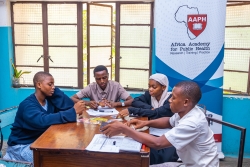
Adolescent mental health disorders are a growing global concern, particularly in low-resource settings where access to effective care is limited. This research project aims to culturally adapt and test a hybrid mental health training for adolescents in Sub-Saharan Africa (SSA), using a human-centered design approach. The training focuses on emotion regulation, a key protective factor in adolescent mental health, and integrates both digital and face-to-face components.
Existing mental health interventions are often developed within Western contexts and fail to address the unique socio-cultural realities of marginalized populations. This project addresses that gap by applying a systematic framework for cultural adaptation. The process involves understanding local concepts of distress and emotion regulation, assessing the accessibility and acceptability of current training components, and co-creating a contextually relevant delivery model with adolescents and community stakeholders.
The digital component, developed by the Central Institute of Mental Health (Germany), leverages ecological momentary assessment (EMA) to offer personalized, real-time mental health training. The face-to-face component is based on the tiered caregiving model of the Shamiri Institute (Kenya), using trained lay providers to support adolescents. These components are being merged and adapted through a participatory process led by the Heidelberg Institute of Global Health and Shamiri Institute.
In Tanzania, the Africa Academy for Public Health (AAPH), in collaboration with the University of Dodoma (UDOM), is implementing a three-phase research project with participants from Tambaza High School, Muhimbili University of Health and Allied Sciences (MUHAS), and Don Bosco Youth Centre, Upanga.
Phase one includes participatory workshops using storytelling, focus groups, and surveys to explore emotion regulation. Phase two features a two-week test of the hybrid training, collecting user feedback. Phase three comprises co-design workshops to refine and prototype the final intervention.
This project aims to create a culturally grounded, scalable solution that improves adolescent mental health and strengthens equitable care delivery across SSA.
